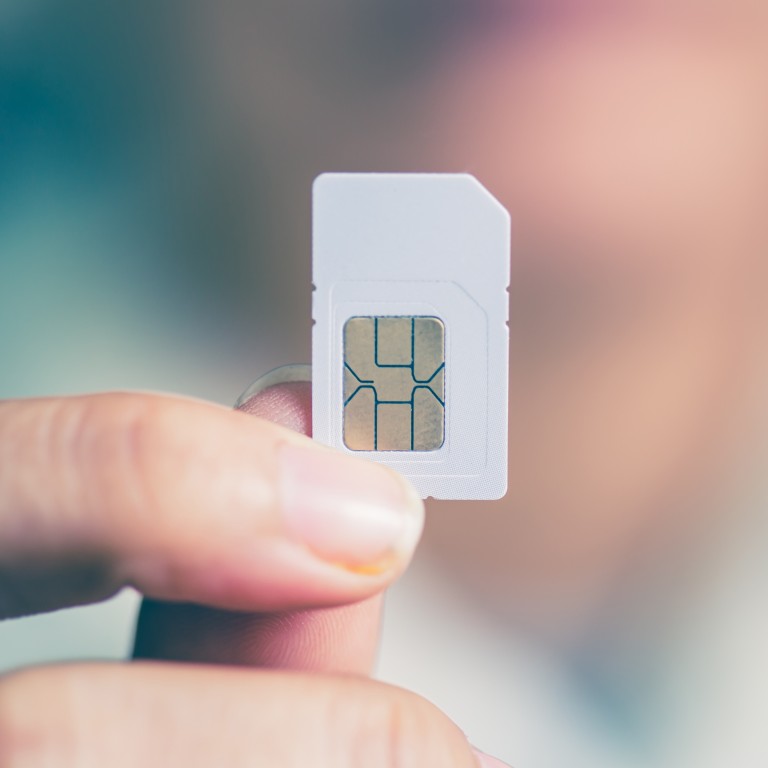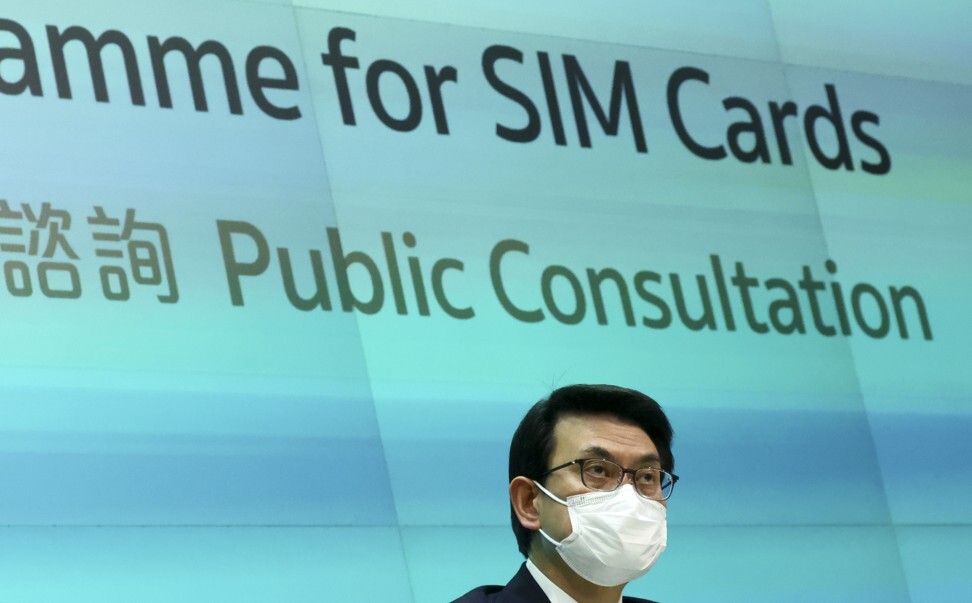
Hong Kong proposes mandatory registration of mobile phone numbers to tackle organised crime
- Mobile phone users required to register their numbers under real identities in proposed overhaul of SIM-card rules
- Ministers say reform is needed to tackle serious and organised crime
All Hong Kong mobile phone users will have to provide their real name and personal details under proposals for compulsory SIM-card registration in the city, with officials blaming criminals for exploiting the current system.
Mandatory registration could be extended to users of prepaid SIM cards, requiring them to provide their full name, a copy of their identity document and date of birth, the government suggested on Friday as it launched a one-month public consultation on the proposals.
Under the planned reforms, law enforcement agencies such as police, immigration, and anti-corruption authorities would have the power to obtain registration records without a court warrant in urgent or emergency situations, but an approval from an officer with the rank of superintendent or above would be needed.
The Commerce and Economic Development Bureau said in a consultation document that the measures aimed to better regulate SIM services, and anonymous pay-as-you-go cards allowed criminals to evade detection when committing offences such as phone scams. The cards were also a common tool in serious and violent crimes that threatened public safety, it added.
Hong Kong police win broader powers to search arrested people’s phones
Currently, 11.7 million prepaid SIM cards are circulating in Hong Kong while 9.2 million service plans have been taken out, making a total of 20.9 million mobile subscriptions. That works out at almost three SIM cards per person on average for the 7.5 million population.
Only those on SIM service plans – or contracts – are currently required to register their real information, with users of prepaid cards not covered.
Under the proposal, telecoms firms would need to establish a registration system and database ready to go live within 120 days of the scheme’s launch. From that date onwards, new cards for sale would have to comply with registration rules before they could be activated for use.
Old sim cards already in use would be required to be registered retrospectively within 360 days of the regulation taking effect.
Secretary for Commerce and Economic Development Edward Yau Tang-wah said 90 per cent of con artists used prepaid cards for deceptions, while 70 per cent of offenders involved in serious crimes such as murder, robbery, burglary and drugs also relied on the cards.
“If we can eliminate these difficulties in detecting crime, actually the new measures do not affect law-abiding citizens but better protect their safety,” he said, adding that 155 countries had adopted similar regulations.
On the draft regulations’ warrant-free provisions, Yau said: “The data [officers can obtain] only includes the registration particulars. It doesn’t include the content of the conversations.”
Yau said telecoms companies would have to keep the records for a year after the cards were no longer in service, but the government would not have direct access to the database.

The consultation paper suggested limiting each user to registering a maximum of three prepaid SIM cards with each of Hong Kong’s 30 or so telecoms companies, to avoid creating a secondary market that would help criminals to remain anonymous.
Registrants aged under 16 should be endorsed by an “appropriate adult” such as a parent, relative or guardian, according to the document.
He cited figures showing that reported phone scams jumped from 615 in 2018 to 1,108 in the first 11 months of 2020, with victims losing more than HK$563 million.
“The card has become a tool of the criminal,” Au said. “After committing crimes, they can keep getting a new one to avoid our detection. Without the culprits’ identity, investigations became more difficult.”
Facial recognition in gaming has security risks, industry group warns
He also said criminals had used phones with unregistered SIM cards to remotely detonate home-made bombs, “blatantly putting our community at risk”.
At least four bombs with similar mechanisms were uncovered during the social unrest in 2019 and 2020, Au added.
While Au said authorities had no plans to regulate SIM cards activated overseas, criminals using such cards would bear extra costs, and local and foreign law enforcement agencies would collaborate to crack these cases.
Asked to define the “urgent or emergency situations” in which warrants were not needed, Au said common sense would dictate, pointing to law enforcement operations that were a matter of life and death, as well as serious offences with a minimum penalty of three years in prison, such as kidnapping and human trafficking.

One of the biggest telecoms companies, 3 Hong Kong, said it would review the consultation paper and make suggestions to the government.
Barrister Anson Wong Yu-yat said it would be difficult for senior-ranked law enforcers to act impartially and the proposal might be subject to legal challenges.
“While officers are inclined to achieve the same objectives as the agencies, judicial officers have an important gatekeeping role to strike a balance between law enforcement and privacy protection,” Wong said.
Pro-establishment lawmaker Elizabeth Quat welcomed the move, saying the worldwide practice was “urgent and necessary” to curb increasing illegal activities, while experiences on the mainland and Macau had been smooth with little inconvenience for citizens.
A police detective said when investigating cases such as phone scams, tracking down subscribers of a number would be the first step.
“If it is a ‘space card’, it is impossible to investigate. Even if we halt the transactions, we cannot arrest the masterminds and they will go on to fish for the next target,” the insider said.
Officials plan to implement the new regulations over two phases, the first requiring telecoms firms to establish a registration system and database ready to go live within 120 days of the scheme’s launch.
From that date onwards, new cards for sale would have to comply with the registration rules before they could be activated for use.
The second phase, applying within 360 days of the regulations taking effect, would then require the retrospective registration of old SIM cards already activated and in use. Those that are not registered in that time frame will no longer work.
About 155 countries such as Australia and France require some form of mandatory SIM-card registration, forcing new users to provide information that ranges from an address to biometric data such as facial scans and fingerprints.
Police seized 3,700 mobile phones during protests, security chief reveals
Since December 2019, all mobile phone users in mainland China have been legally required to submit to facial recognition scans when registering new SIM cards, raising concerns about information security and consent.
The Ministry of Industry and Information Technology described the measures as a way to “protect the legitimate rights and interests of citizens in cyberspace”, making Chinese mobile phone and internet users easier to track.
Previously, mobile phone users on the mainland only had to register SIM cards with their identity cards or passports.
Some jurisdictions require consumers to provide proof of identification to activate and use a mobile SIM card.
Yau said the authorities had no intention to require users to register facial scans, as on the mainland, before buying new SIM cards.
Former opposition lawmaker Raymond Chan Chi-chuen said he believed authorities were using crime prevention as a pretext to step up the surveillance of ordinary citizens.
“People may still commit crimes by using SIM cards bought from countries that do not require real-name registrations,” he said.
“The real intention of the authorities is to reduce ways of untraceable communications among citizens.”
The legislation specifies communications relating to schools, universities, social organisations, the media, and the internet.


